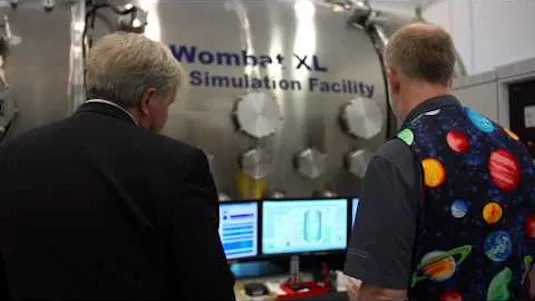
Astrophysics: Cosmology 
This course covers the fundamentals of cosmology, the study of the universe. Learn from experts Lawrence Krauss and Brian Cox about the origin, evolution, and future of the universe. Understand the latest breakthroughs and unsolved mysteries in cosmology, and explore the theories behind modern cosmology. This course is designed for those with a high school level of Maths and Physics, and is part of the ANUx Astrophysics XSeries program. Register today and start your journey into the mysteries of the universe! ▼
ADVERTISEMENT
Course Feature
![]() Cost:
Cost:
Free
![]() Provider:
Provider:
Edx
![]() Certificate:
Certificate:
Paid Certification
![]() Language:
Language:
English
![]() Start Date:
Start Date:
Self paced
Course Overview
❗The content presented here is sourced directly from Edx platform. For comprehensive course details, including enrollment information, simply click on the 'Go to class' link on our website.
Updated in [May 25th, 2023]
This course, Astrophysics: Cosmology, is designed to provide an overview of the study of our entire universe. Students will explore the latest advances and unsolved mysteries in cosmology, and learn about the theories behind modern cosmology with the help of guest speakers Lawrence Krauss and Brian Cox. The course is suitable for those who would like to gain a deeper understanding of astronomy than that offered by popular science articles and shows, and requires reasonable high-school level Maths and Physics to get the most out of it. This course is one of four ANUx courses which together make up the Australian National University's first year astrophysics program, and can be taken in any order.
[Applications]
Those who have completed this course in Astrophysics: Cosmology will have a better understanding of the universe and its mysteries. They will be able to apply their knowledge to further their studies in astrophysics, as well as to other areas of science and technology. They will also be able to use their knowledge to better appreciate the beauty of the universe and its many wonders.
[Career Paths]
1. Astronomer: Astronomers study the universe and its components, such as stars, planets, galaxies, and other celestial bodies. They use telescopes, satellites, and other instruments to observe and analyze the data they collect. Astronomers are also involved in developing theories and models to explain the data they collect. Astronomers are in high demand, and the field is expected to grow in the coming years.
2. Astrophysicist: Astrophysicists are scientists who specialize in the study of the physical properties of the universe. They use mathematics, physics, and computer simulations to understand the behavior of stars, galaxies, and other celestial objects. Astrophysicists are also involved in developing theories and models to explain the data they collect. The field of astrophysics is expected to grow in the coming years.
3. Space Scientist: Space scientists study the physical properties of the universe, such as the composition of planets, stars, and galaxies. They use mathematics, physics, and computer simulations to understand the behavior of these objects. Space scientists are also involved in developing theories and models to explain the data they collect. The field of space science is expected to grow in the coming years.
4. Data Scientist: Data scientists use data to understand the behavior of the universe. They use mathematics, physics, and computer simulations to analyze the data they collect. Data scientists are also involved in developing theories and models to explain the data they collect. The field of data science is expected to grow in the coming years.
[Education Paths]
1. Bachelor of Science in Astrophysics: This degree program provides students with a comprehensive understanding of the physical universe, from the smallest particles to the largest galaxies. Students will learn about the structure and evolution of the universe, the physics of stars and galaxies, and the nature of dark matter and dark energy. They will also gain an understanding of the tools and techniques used to observe and measure the universe. This degree program is ideal for those interested in pursuing a career in astrophysics or related fields.
2. Master of Science in Astrophysics: This degree program provides students with an advanced understanding of the physical universe. Students will learn about the structure and evolution of the universe, the physics of stars and galaxies, and the nature of dark matter and dark energy. They will also gain an understanding of the tools and techniques used to observe and measure the universe. This degree program is ideal for those interested in pursuing a career in astrophysics or related fields.
3. Doctor of Philosophy in Astrophysics: This degree program provides students with an in-depth understanding of the physical universe. Students will learn about the structure and evolution of the universe, the physics of stars and galaxies, and the nature of dark matter and dark energy. They will also gain an understanding of the tools and techniques used to observe and measure the universe. This degree program is ideal for those interested in pursuing a career in astrophysics or related fields.
4. Master of Science in Astronomy: This degree program provides students with an understanding of the physical universe from a different perspective. Students will learn about the structure and evolution of the universe, the physics of stars and galaxies, and the nature of dark matter and dark energy. They will also gain an understanding of the tools and techniques used to observe and measure the universe. This degree program is ideal for those interested in pursuing a career in astronomy or related fields.
The development trends in astrophysics and cosmology are rapidly changing as new technologies and discoveries are made. In particular, the use of powerful telescopes and other instruments to observe the universe is becoming increasingly important. Additionally, the use of computer simulations and data analysis techniques to study the universe is becoming more common. Finally, the development of new theories and models to explain the universe is also an important area of research.
Course Provider

Provider Edx's Stats at AZClass
Discussion and Reviews
0.0 (Based on 0 reviews)
Explore Similar Online Courses

Predicting House Prices with Regression using TensorFlow

Project Management: Human Resources and Leadership - FutureLearn

Python for Informatics: Exploring Information

Social Network Analysis

Introduction to Systematic Review and Meta-Analysis

The Analytics Edge

DCO042 - Python For Informatics

Causal Diagrams: Draw Your Assumptions Before Your Conclusions

Whole genome sequencing of bacterial genomes - tools and applications

Astrophysics & Cosmology

Astrophysics & Cosmology

Astrophysics
 Related Categories
Related Categories
 Popular Providers
Popular Providers
Quiz
 Submitted Sucessfully
Submitted Sucessfully
1. What is the prerequisite for this course?
2. What is the XSeries program?
3. Who are the guest speakers in this course?
4. What is the Australian National University's first year astrophysics program made up of?
Correct Answer: Four ANUx courses


Start your review of Astrophysics: Cosmology